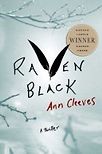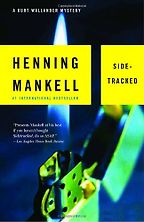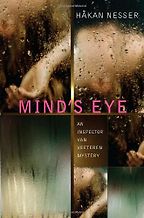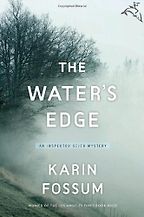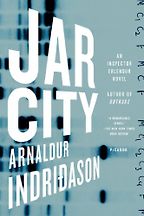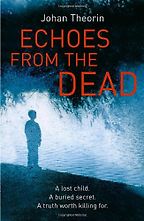Tell me about Sidetracked.
Sidetracked has Kurt Wallander as the central character and he’s the classic miserable cop in the tradition of Ian Rankin’s Inspector Rebus. It has one of the most brilliant openings. Henning Mankell is great at setting up stories, it’s always really visual. There’s a young woman running through a field of rape. You can just imagine this woman and the yellow rape and she sets fire to herself. Kenneth Branagh bought the rights to this series of books and I think he’s filmed three of them. The setting is very important. These ones are set in Sweden, always away from the centre, isolated, in rural settings. One is on a nature reserve, and there’s one in a deserted farm house. You’ve got these small communities where everyone knows each other’s secrets. Mankell has quite an interesting political perspective too. He was quite left-wing and this really comes out in his writing. This one has a plot involving immigration and corrupt politicians. There isn’t a lot of light relief. Very few jokes. He was one of the first Scandinavian writers to be translated into English so he’s the standard – gruesome murders and bleak landscape.
Does the Nesser have that bleakness too?
Well, he does but this one, The Mind’s Eye, is much lighter. It’s also Swedish but the central character, another cop, Van Veeteren, is grumpy but has a great sense of humour so the book is full of jokes, one-liners. There is a sense of fun and play in Nesser. This book was the third one of his to be translated into English and although he’s a Swede his books aren’t set in any European country. It’s a fictitious place that’s never named. You start off kind of thinking it’s Holland but then it isn’t. This is always the question – where is Nesserland? This one starts with someone stumbling into the bathroom with a very bad hangover and finding his wife dead. He has no memory of attacking her and can’t remember anything.
But he assumes he did attack her?
He and everybody else. But this being Sweden, or wherever it is, he isn’t executed or anything, he’s sent to a psychiatric hospital and his memory starts to come back. Van Veeteren, of course, is convinced the husband didn’t do it. There’s this sense always that the past is affecting the present. He’s good on writing children, Nesser. He’s always very good on kids and teachers and schools. There is often a school in his books.
Is there a kind of moral point?
All crime fiction is moral in a sense. Apart from Ripley, I suppose, because he’s the murderer. But usually, you get some sort of resolution. In that framework the thing is that you can’t get away with murder.
And the Karin Fossum?
Fossum is Norwegian and she’s very intense. When you meet her she’s very intense. She writes about these small communities and she writes beautifully. It’s beautiful language and the translation’s really good. She’s good on the rippling out from tragedy. So a child is killed and she writes about the ramifications, the effect on other people in the community. Again she has a male detective who sorts it out.
Do you have a male detective too?
I’ve got two different series, one male detective and one middle-aged female who’s overweight and can’t run. I wanted to do something different.
Good.
The Fossum is very Scandinavian, this big landscape, a bit snowy, people walking along the edge of a lake. And in this one they find a body and the book is about how that affects their lives. They didn’t have a good relationship to begin with but after this it sort of fractures more. The guy enjoys being a minor celebrity and giving interviews and he takes a picture of the body with his phone. And she is disgusted by this. But you can imagine, can’t you, how someone might behave like that?
I can.
And they were witnesses and saw someone who might have been the murderer walking away. It’s this bleak, snowy, wild space and it’s more than a backdrop, I think. It really affects the people that grow out of that landscape, and the landscape.
Is the landscape a metaphor for something?
Yes. I’m sure it is. Fossum is a poet. She was shortlisted for the Crime Writer’s Association Golden Dagger Award in 2005. I won in 2006 for Raven Black. That year they began an international award for translated fiction, which doesn’t usually get included in the main awards. It’s good because it recognises the author but also the translator as well.
What about Jar City?
This is Icelandic and it’s the first in the series. Another miserable cop and the backdrop of Iceland which is bleak and rainy or snowy. The cop has a daughter who’s a junkie and he doesn’t see much of his kids. I chose this one because it could only have been set in Iceland, could only have been about Iceland. The plot is all about the human genome discovery and stuff. I won’t go into it but it has these medical and scientific projects going on and the jars are the test tubes and jars with parts of the body in them.
Why are all the detectives miserable men?
I suppose it’s traditional. It started in the States with Philip Marlowe – you know, they drink too much and are flawed in some way. If you have to follow this guy through half a dozen books it’s more interesting if he’s flawed. He has to keep your interest. I mean, Ruth Rendell’s Wexford who is happily married and all that, he gets very boring after a while.
How is Nordic crime fiction different from any other crime fiction? What makes these books special?
It’s like virtual travel. It’s not only a good novel but you get a sense of another country and of that country’s preoccupations.
What are Nordic preoccupations?
There is a lot of morality in a way and the novels are much more literary, more philosophical. I know Karin Fossum sees herself as a descendent of Ibsen. You don’t get all the slash and rip, car chasey, pacy stuff that you get in a lot of American and now British novels.
What about the Johan Theorin?
This one is so interesting. I judged the International Daggers this year and he was highly commended. It’s his first novel and it’s set on Øland, an island in the Baltic off Sweden. Many years ago a small boy disappeared. He just climbed over his parents’ garden wall and went into the fog.
Is this true?
No, in the novel. And his mother has fallen apart and his grandfather is in residential care. He’s really, really good on ageing – on losing the ability to make the body do what it should. Anyway, the grandfather has the child’s shoe sent to him in the post.
That’s so exciting!
It’s a really good novel. It’s a first novel, you know, so it could have been tightened up a bit but he’s very good on the sense of place and the industry that used to be there but is gone. Quarrying and the ships that once came in but don’t anymore.
All these novels seem to be permeated by loss. Is that fair?
Absolutely. They are all rural too and there is a sense of the landscape that can be hostile.
July 23, 2009. Updated: April 23, 2024
Five Books aims to keep its book recommendations and interviews up to date. If you are the interviewee and would like to update your choice of books (or even just what you say about them) please email us at [email protected]
Five Books interviews are expensive to produce. If you've enjoyed this interview, please support us by donating a small amount.

